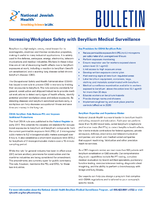Kontron Modular Computers Completes Acquisition of Thales Computers
Share:
Natick, Massachusetts - March 20, 2008 - Earlier this week, Kontron Modular Computers GmbH finalized its acquisition of Thales Group's Thales Computers subsidiary.
Thales Computers, headquartered in Toulon Cedex, France, has 100 employees that shipped approximately EUR 20 million worth of embedded computer systems in 2007. Founded in 1986, the company designs, builds, markets and services COTS-based, rugged, high-performance embedded systems. Its offerings include VME, cPCI and PMC architectures utilizing PowerPC processing platforms. The primary market served by Thales is military/aerospace.
Kontron Modular Computers, headquartered in Kaufbeuren, Germany, is one of the largest suppliers of embedded computing systems in the world. During the past decade the company has also been one of the industry's most active acquirers. The company serves virtually every technical, vertical and regional market segment in the global embedded computing systems market. Its current competitive position includes share leadership in many of the markets it serves, beachheads in key emerging markets, and the firm is quite hedged through its diverse product offerings. One of its few blind spots is the VME military/ aerospace COTs market.
Thales Computers fills a need for Kontron to strengthen its positions in the VME and military/aerospace markets. That is clear. But, what more can we learn from this deal? Does the timing make sense? What does the deal mean for the market? Competition?
The Kontron Deal
Both companies were ripe for this transaction.
Kontron recently divested its rugged mobile computing division (sold to Crane Corporation in August 2007). This deal virtually eliminated Kontron's footprint in the rugged mobile business, and negatively impacted total revenues. For a company with aggressive, public growth goals, deals that reduce scale are not part of the core plan.
However, the divestiture produced cash at a time when the global M&A markets preferred cash deals from operating companies versus highly leveraged deals structured by financial buyers.
Kontron needed to replace that lost revenue quickly - and with a property that was in alignment with its core business. The preferable deal would be for a company that would help Kontron balance some risk in its technical portfolio.
During the past few years, Kontron was making clear statements, and sizeable commitments, in the emerging - and less certain - embedded markets for ATCA and MicroTCA. The company continued to thrive in other more mature markets, including cPCI, PCI, COMs, and others. However, as recently as last Fall, Kontron senior managers were sharing what sounded like a 'harvest' strategy for its VME business.
Kontron's position on VME appeared to be focused on support for clients with legacy product requirements, but, no significant new investment in VME solutions.
And while the ATCA and MicroTCA markets are developing, they have met only the most conservative market forecasts. At the same time, VME - through a number of new implementations - was actually gaining share in a number of markets. In COTs and a number of other markets - VME has been transfigured from an 'anchor' a decade ago that would lose share to newer architectures and drag suppliers down with it - to a much sought-after stable source of revenue. And for the well-positioned supplier, with innovative design extensions and world-class professional services, a path to gaining share.
Kontron, for all its strength, appeared to be developing an Achilles heel. And it was too little exposure to VME, especially in COTs markets. Further, if Kontron was going to realize its full potential in the embedded COTs market for military/aerospace systems, it would need a VME offering.
The Thales Computers Deal
Thales Computers - at roughly 20 million Euros - was a fairly small part of Thales' Group's portfolio of companies. Thales Group's total turnover in 2007 was approximately 936 million Euros. Much of that business is in higher value-adding defense subsystems and solutions.
Along with many of its peers, Thales Group has been rationalizing its business to support the current realities and emerging requirements in defense contracting:
Migrating select proprietary content to COTs;
Driving material increases in mission availability; and
Reducing acquisition and maintenance costs for the programs it supported.
Five years ago, these were significant competitive advantages. Today, in some defense markets, they are requirements to make the bid list.
In this context, it appears that Thales Computers was not strategic - unless Thales Group wanted to be supplying its peers with Thales Computers technology. Rumors of a Thales Computers sale have surfaced every couple of quarters for the past few years.
It would appear that Thales Group solicited an offer that it was pleased with. And with 20% growth in its total turnover 2006-2007 - largely on the strength of order in avionics, command and control, and radar; and acquisitions - it appears it had a better use for the cash that would be generated from a sale of Thales Computers.
Sort of like Kontron's position with its rugged mobile business. For both businesses it seems, the time had come to refocus on core markets.
VME: The Impetus of the Deal
VME has been around for over 26 years because the standard has been extremely versatile in its ability to reinvent itself many times over the past quarter century and remain relevant.
In the past few years VME made yet another transformation - not the VXS and VPX transformation currently taking hold which should extend the technical viability of VME another generation, but rather the commercial transformation from what many critics dubbed an ageing and declining market to the safe harbor of the embedded computing industry.
VME is not only a sizeable market, with over $1 billion in total board and system revenues a year, but is also the most stable embedded market, typically better insulated from fluctuations and volatility experienced in other technical segments of the embedded market. Moroever, VME military COTs tends to offer successful suppliers higher margin opportunities than many other segments.
Many diverse embedded suppliers have recommitted to VME recently because VME provides them with a safe harbor that shields them from fluctuations in other sectors, enables them to position themselves correctly as broad-scope embedded suppliers, and gives them the key platform technology required in many COTs markets.
Kontron, in similar fashion to GE Fanuc last year with its Radstone acquisition, found dockage of its own in the VME safe harbor with Thales Computers.
The Impact of the Deal
First, Thales offerings are complimentary to Kontron's. There is no material overlap, therefore rationalization requirements are minimal. And those that emerge, should not be a distraction for Kontron. This is a company that has efficiently and intelligently executed much more complicated rationalizations with much larger portfolios in the past.
The primary overlap will be in the cPCI and PMC board lines. Thales' positions are much smaller and more limited than Kontron's. However it is possible that the company will carry both companies' lines for some time. Winners stay. Losers go home.
Kontron reported more than 400 million Euros in turnover in its last fiscal year-end, has a relatively limited presence in the program-driven, network-dependent COTs market. While 'only' 20 million Euros, Thales provides a substantial baseline business in VME for COTs.
Second, this deal shines yet another spotlight on two markets that had been overshadowed during most of the past decade: VME and COTs.
Mercury Computer Systems - the 'purest' play VME suppliers - and the standard by which many in the high performance segments of the embedded markets are measured, recently doubled-down on its VME commitment with a number of new offering rooted in VME.
Emerson Network Power, through its own portfolio and its recently acquired Motorola Embedded Computing and Communications division products, is recommitting to VME, if not so much COTs, in a very powerful way.
Curtiss Wright Controls Embedded Computing has - through its own native engineering talent and acquisition - solidified itself as one of the top two suppliers of VME with a broad-based business in COTs. The other top two player, GE Fanuc, acquired Radstone recently as its path to larger VME and COTs opportunities.
If Kontron was to continue to compete with the top-tier suppliers in COTs, it needed a strong VME position. And there were not many properties of scale remaining. Thales Computers would do just fine.
More to the point: Thales' stable VME portfolio enables Kontron to:
Participate more aggressively in COTs;
Open a new front in its heated battle(s) with GE Fanuc, Emerson and others in VME markets outside COTs; and Augments the company's position to support accounts that require world class support for multiple architectures.
For the market, quite simply, they have another very attractive option for large-scale VME programs. Kontron's new position in VME - bringing with it Kontron's marketing capabilities - will likely provide additional attention to this architecture. That, in turn, could generate demand for the broader - and emerging - VME opportunities in VME 64, VXS and VPX-REDI architectures. Customers will have more choice and likely better pricing. They will also have a VME supplier committed to finding higher value-add opportunities, without competing with customers.
VME will have another champion. Kontron will have another arrow in its quiver. Competition in VME and COTs will have a new challenger. The market will have more options.
Not a bad deal all the way around.
ABOUT VDC
Venture Development Corporation (VDC) is an independent technology market research and strategy consulting firm that specializes in a number of industrial, embedded, component, retail automation, RFID, AIDC, datacom/telecom, and defense markets. VDC has been operating since 1971. Today, we employ a talented collection of analysts and consultants who offer a rare combination of expertise in the market research process; experience in technology product and program management; and formal training in engineering and marketing. VDC's clients include thousands of the largest and fastest-growing technology suppliers in the world and the most successful investors participating in the markets we cover.
For further information about our Embedded Hardware and Systems research offerings contact:
Eric Heikkila, Practice Director, Embedded Hardware and Systems Practice, 310.393.9086, erich@vdc-corp.com
Cyril Bernard, Account Executive, 508.653.9000 x: 142, cbernard@vdc-corp.com




